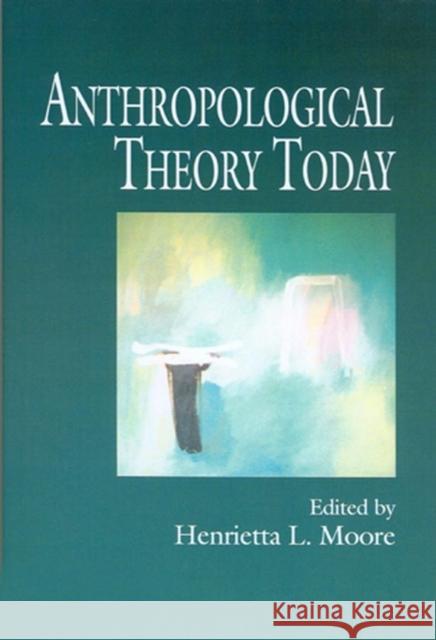Anthropological Theory Today » książka



Anthropological Theory Today
ISBN-13: 9780745620237 / Angielski / Miękka / 2000 / 304 str.
Anthropological Theory Today
ISBN-13: 9780745620237 / Angielski / Miękka / 2000 / 304 str.
(netto: 165,80 VAT: 5%)
Najniższa cena z 30 dni: 106,00
ok. 16-18 dni roboczych.
Darmowa dostawa!
This important book makes a bold statement about the nature and value of anthropological theory at the beginning of the 21st century.
′Thoroughly engaging, provocative, and forward–reaching,
Anthropological Theory Today is a testament to the vigor, diversity, and critical purchase of anthropological theorizing at the late modern end of our century. This is a major and scintillating collection of fresh theoretical contributions – previously unpublished – by an innovative group of anthropology′s important scholars. We owe a major debt to Henrietta Moore for having conceptualized this important volume and for introducing it so productively.′
Bruce Knauft, Department of Anthropology, Emory University
′Leading members of the younger generation of anthropologists engage with confidence and passion topics ranging from ideologies of economics, liberalism and military violence to gender, body, self and mind. Readers will find much to learn from and much to debate within these smart, substantial essays that illustrate the ethical and intellectual excitement, range and complexity of contemporary inquiry.′ Michael Lambek, Department of Anthropology, University of Toronto
"Moore sees anthropology as a debate as well as a set of practices ... The papers in Anthropological Theory Today are appealing [and] stimulating ... I recommend the book highly to practicing anthropologists and graduate students." Anthropos
′[Individual chapters] ... offer not only fresh ethnography, recent theorizing and good, occasionally sparkling analytical points; but they also reveal the new identity of a discipline that has successfully passed through the tunnel of postmodernism and emerged on the other side.′ Ethnos
′There is much to consider in Moore′s substantial Introduction as she presents her view of fundamental questions regarding anthropology and theory and as she introduces the nine papers at some depth.′ Journal of Anthropological Research
" All the chapters in the book are interesting, One strength of this collection lies in the fact that every chapter indicates what its author/s regard/s as cutting–edge research, as well as noting any gaps in their respective sub–fields. This could be helpful new researchers such as postgraduate students. Another of its strengths lies in the bibliographies provided by the various contributing authors. These appear to be quite comprehensive so that if a particular chapter or sub–field appeals there is a wealth of reading to undertake." Journal of Intercultural Studies
<!––end––>
The Contributors.
1. Anthropological Theory at the Turn of the Century. (Henrietta L. Moore).
2. From Private Virtue to Public Vice. (James G. Carrier and Daniel Miller).
3. Clash of Civilizations of Asian Liberalism?:An Anthropology of the State and Citizenship. (Aihwa Ong).
4. The Economies of Violence and the Violence of Economies. (Catherine Lutz and Donald Nonini).
5. Toward an Ethics of the Open Subject: Writing Culture in Good Conscience. (Debbora Battagli).
6. Whatever Happened to Women and Men: Gender and other Crises in Anthropology. (Henrietta L. Moore).
7. The Body′s Career in Anthropology. (Thomas J. Csordas).
8. Human Cognition and Cultural Evolution. Pascal Boyer.
9. Psychoanalysis and Anthropology: On the Temporality of Analysis. (James Weiner).
10. Becoming Undisciplined: Anthropology and Cultural Studies. (Nicholas Thomas).
Index.
Henrietta Moore is Professor of Social Anthropology and Director of the Gender Institute at the London School of Economics and Political Science.
This important book makes a bold statement about the nature and value of anthropological theory at the beginning of the 21st century. It repositions anthropology within current social theory and outlines the changing context in which anthropological enquiry takes place. Anthropology is no longer confined to academic debate and is increasingly part of the practice and theory of development agencies, voluntary organizations, political pressure groups, international organizations and governments. Anthropological theory has become less and less isolated from the communities studied. Communities are increasingly culturally diverse, and ′other cultures′ are no longer in ′other parts′ of the world. The essays in this volume develop new ways of theorizing appropriate to these changed circumstances.
The authors rework the role of the anthropologist in knowledge construction to provide a critique of the working concepts and assumptions of disciplinary theory and practice. The contributions highlight questions of power, domination and discrimination in ways that illuminate current ethical dilemmas in anthropology. Key concept–metaphors – the self, the body, and gender – are subjected to critical assessment, and questions of diversity, agency and representation are given renewed emphasis. The book demonstrates the continuing importance of ethnography to the development of theoretical work in the discipline, and provides new answers to the question ′What is anthropology?′.
This book will be essential reading for all students of anthropology. It will also be of interest to students and scholars in sociology, history and related disciplines.
1997-2026 DolnySlask.com Agencja Internetowa
KrainaKsiazek.PL - Księgarnia Internetowa









